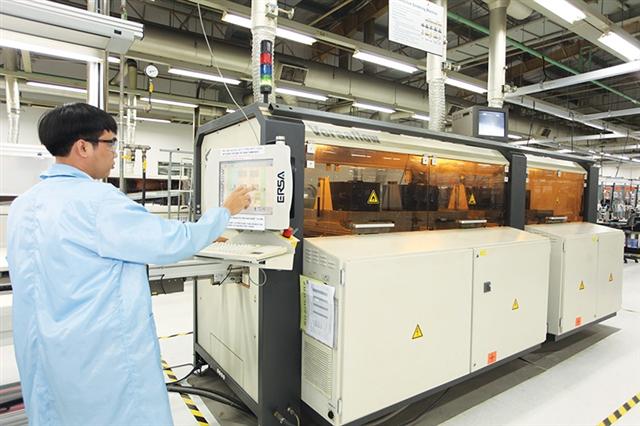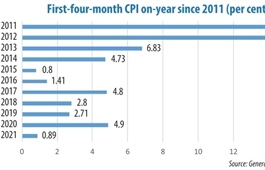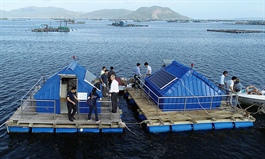US recovery ripple effect for Vietnam
US recovery ripple effect for Vietnam
Along with many nations, the US economy is recovering, leading to a rise in the demand for goods imported from Vietnam amid the two economies witnessing their heyday in bilateral trade and investment ties on the back of various motives, including a huge recently-enacted fiscal scheme initiated by the US government.

Recent growth in Vietnamese exports is partly being helped by economic recovery in the US. Photo: Le Toan
|
The rapid pace of vaccinations and massive scale of fiscal stimulus spending will push the global economy, including the American economy, to recover strongly, the Organisation for Economic Co-operation and Development (OECD) said in its Economic Outlook Interim Report on strengthening the recovery released a few weeks ago.
Global economic prospects have improved, with global GDP growth now projected to strengthen to 5.5 per cent in 2021 and 4 per cent in 2022, instead of -3.4 per cent last year due to COVID-19, the OECD said.
Significant fiscal and monetary support continues to underpin activity. Additional discretionary fiscal measures announced in several countries during the past months will add to the overall support this year, including in the United States, Japan, Germany, Canada, and India. In Europe, spending of over €2 trillion ($2.45 trillion) from the Next Generation recovery fund is due to begin later this year.
The extent of fiscal support in the US this year is set to be considerably larger than in most other economies. The Consolidated Appropriations Act enacted last December contained new temporary measures worth $900 billion (4 per cent of GDP), largely concentrated on emergency assistance for households and the unemployed.
On March 12, US President Joe Biden signed the $1.9 trillion American Rescue Plan Act into law, sending much-needed aid to millions of Americans still struggling from the COVID-19 pandemic.
The plan provides $1,400 direct payments to individuals making up to $75,000 annually, $350 billion in aid to state and local governments and $14 billion for vaccine distribution. The bill also provides $130 billion to elementary, middle, and high schools to assist with safe reopening.
The bill’s economic-relief provisions are overwhelmingly geared toward low-income and middle-class Americans, who will benefit from the direct payments, the bill’s expansion of low-income tax credits, expanded health-insurance access, extension of expanded unemployment benefits, food stamps, and rental assistance programmes. The bill contains little direct aid to high income-earners, who largely retained their jobs during the COVID-19 economic shock and bolstered their savings.
Benefits for Vietnam
Vietnam is an economy largely depending on exports and imports. Figures from Vietnam’s General Statistics Office showed that in 2020, while GDP was valued at $355 billion, total export-import turnover was $544 billion, including $281.5 billion from exports and $262.4 billion from imports. In the first four months of 2021, the economy’s total export-import turnover is estimated to hit $206.51 billion, including $103.9 billion from exports – up 28.3 per cent on-year, and $102.61 billion from imports - up 30.8 per cent on-year.
In this period, the US was Vietnam’s largest export market, with a total turnover of $30.3 billion, up 50.1 per cent as compared to that in the same period last year. Meanwhile, China was Vietnam’s second largest export market ($16.8 billion, up 32.4 per cent on-year), followed by the EU ($12.6 billion, up 18.1 per cent), Southeast Asia ($8.8 billion, up 13.3 per cent), South Korea ($6.9 billion, up 12.1 per cent), and Japan ($6.5 per cent, up 1.5 per cent).
“While the global economy is still being heavily affected by COVID-19, a lack of empty containers, a rise in shipping charges, and other transportation costs, Vietnam’s export-import activities since early this year have been flourishing, with good growth in key exports such as electronics, garments, footwear, machinery and equipment, and farm produce in many markets, especially in major ones like the US, China, the EU, South Korea, Japan, and ASEAN,” said Deputy Minister of Industry and Trade Cao Quoc Hung. “It is forecast that Vietnam’s export-import activities will continue thriving in the coming time when free trade agreements are implemented further. Especially, besides support packages launched by nations to support their people and enterprises, deals such as the Comprehensive and Progressive Agreement for Trans-Pacific Partnership and those with the EU and the United Kingdom will facilitate Vietnamese products to enter partner markets with preferential tariffs,” Hung said.
Furthering ties with the US
In the US’ National Security Strategic Guidance issued in March, US President Biden stated, “We will deepen our partnership with India and work alongside New Zealand, as well as Singapore, Vietnam, and other ASEAN member states, to advance shared objectives.”
Carl Thayer, emeritus professor at the University of New South Wales, said that there will be considerable continuity in the Biden administration’s policy from that of the Trump administration.
“President Biden’s National Security Strategic Guidance sets out to engage Vietnam (along with India). The Biden administration will set a priority on enhancing its comprehensive partnership with Vietnam in all nine areas of cooperation spelled out in the 2013 original joint statement during the Obama administration when Biden was vice president.”
The partnership covers furthering bilateral economic, commercial, and investment ties as one of the key pillars of bilateral cooperation.
Early this year, Vietnam and the US agreed the bilateral ties have advanced across fields over the past 25 years, pledging to cooperate in deepening the ties “in a more comprehensive manner, with a focus on economy-trade-investment, overcoming war consequences, enhancing maritime capacity, fighting COVID-19 and adapting to climate change. The US reaffirmed it continues “attaching importance with Vietnam”.
It is expected that in 2021, there will be more connections and talks between both nations’ high-level leaders, investors, and enterprises.
Adam Sitkoff, executive director of the American Chamber of Commerce in Hanoi told VIR that he expected the US-Vietnam trade and investment cooperation will further flourish in the coming time.
“Vietnam and the United States have developed a healthy commercial relationship that has created jobs, tax revenues, and opportunity for citizens of both countries,” Sitkoff said. “The US is Vietnam’s largest export market. Vietnam also receives billions of US dollars of foreign investment from US companies each year - much of it to build integrated supply chains that benefit American consumers. At the same time, Vietnam has become one of America’s fastest growing export markets.”
In 2020, the total export-import turnover between Vietnam and the US was $90.1 billion, up from $76 billion in 2019. In the first four months of 2021, the figure was $35.36 billion.
Responding to a VIR question on whether the US’ $1.9 trillion fiscal package aimed to spur on domestic consumption, Sitkoff said that it has also partly caused a rise in Vietnamese exports to the US. “Anytime American consumers are feeling confident about their finances, it is a positive for exports to the US,” he said.
According to Sitkoff, recent growth in Vietnamese exports to the US is partially due to the strong economic recovery and consumer spending in the US. However, most of the export growth to the US appears to be driven primarily by the relocation and reassessment of supply chain sourcing from China to Vietnam.
“COVID-19 is likely to continue causing economic disruption. However, I believe the trade and investment relationship between Vietnam and the US will keep growing stronger in the days ahead,” Sitkoff said.
Statistics from Vietnam’s Ministry of Planning and Investment showed that as of April 20, US investors registered over $9.57 billion in Vietnam for nearly 1,100 valid projects, making the US the 11th-largest foreign investor in the Southeast Asian nation. In the first four months of 2021, the US ranked sixth in investment in Vietnam, with total newly-registered capital of $181 million.
Currently many US firms are exploring opportunities in Vietnam, such as Morgan Stanley, ACORN International, General Dynamics, Nue Capital LLC, BlackRock’s Asian Credit, Lockheed Martin International, Smart City Works, Google, Columbia University, and USTelecom.
Intel is now asking Ho Chi Minh City People’s Committee for special incentives for its further investment. In January, Intel Corporation announced it has invested a further $475 million in Intel Products Vietnam.
“This new investment is in addition to Intel’s $1 billion investment to build a state-of-the-art chip assembly and test manufacturing facility in Saigon Hi-Tech Park, first announced in 2006. This takes Intel’s total investment in its Vietnam facility to $1.5 billion,” Intel said in a statement.
|
We see largely positive implications for Vietnam arising from the incoming Biden administration. We expect the impact on trade to be positive, given the reduced risk of punitive trade tariffs (which were imposed under President Trump’s currency policies) and because of the ongoing trend of the relocation of manufacturing out of China to other Asian countries, including Vietnam, over the coming years. Vietnam’s trade would also receive a boost should Joe Biden decide to rejoin the Comprehensive and Progressive Agreement for Trans-Pacific Partnership. Biden’s impact on Vietnam’s trade will most likely be positive. Global manufacturers have been gradually diversifying their supply chains away from China and across Asia over the past decade in an attempt to contain production cost increases from rising labour costs in China. This trend was accelerated from 2018 after the Trump administration levied sweeping tariffs on Chinese exports, which started the China-US trade war, prompting companies to seek alternative manufacturing locations to circumvent the US’ tariffs. In particular, Vietnam continues to be a major beneficiary of this manufacturing shift owing to favourable labour demographics, relatively low labour costs, foreign direct investment-friendly policies, and most recently high market access to the EU following the ratification of the EU-Vietnam Free Trade Agreement. Biden is likely to take a more pragmatic view towards trade developments with its economic partners. In particular, we believe that the Biden administration will come to understand that Vietnam’s trade surplus with the US will grow as more manufacturers relocate to the Southeast Asian nation due to the ongoing US-China trade war. Furthermore, while there is bipartisan support in the US for a hardline stance on trade with China, we believe that a desire by the Biden administration to rebuild its relations with its allies would see an easing of the trade tensions with allied countries generated by the Trump administration. Therefore, we believe that a Biden administration will entail lower risk of further US tariffs on Vietnamese exports. Source: Fitch Solutions Group Ltd. |



























